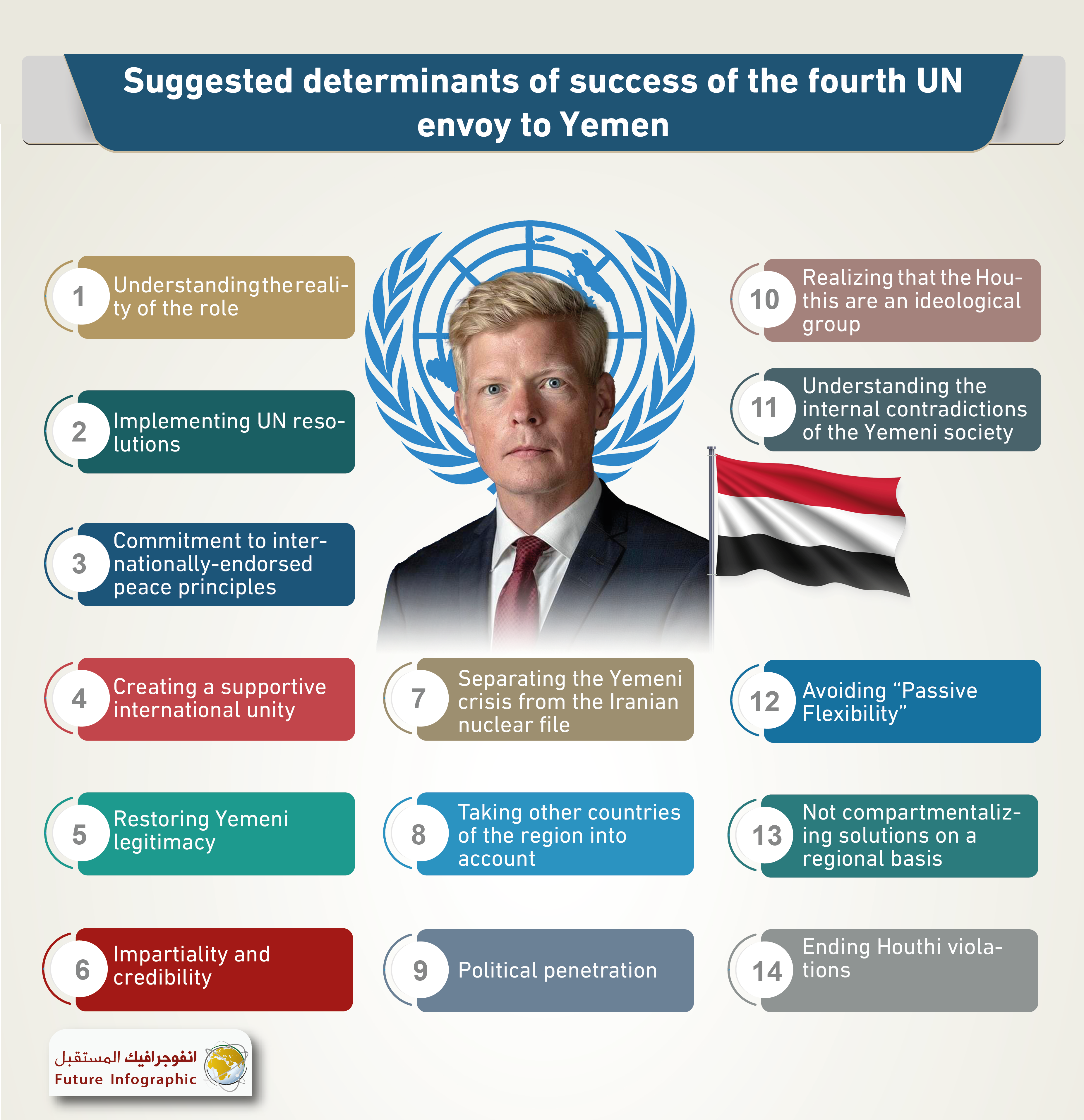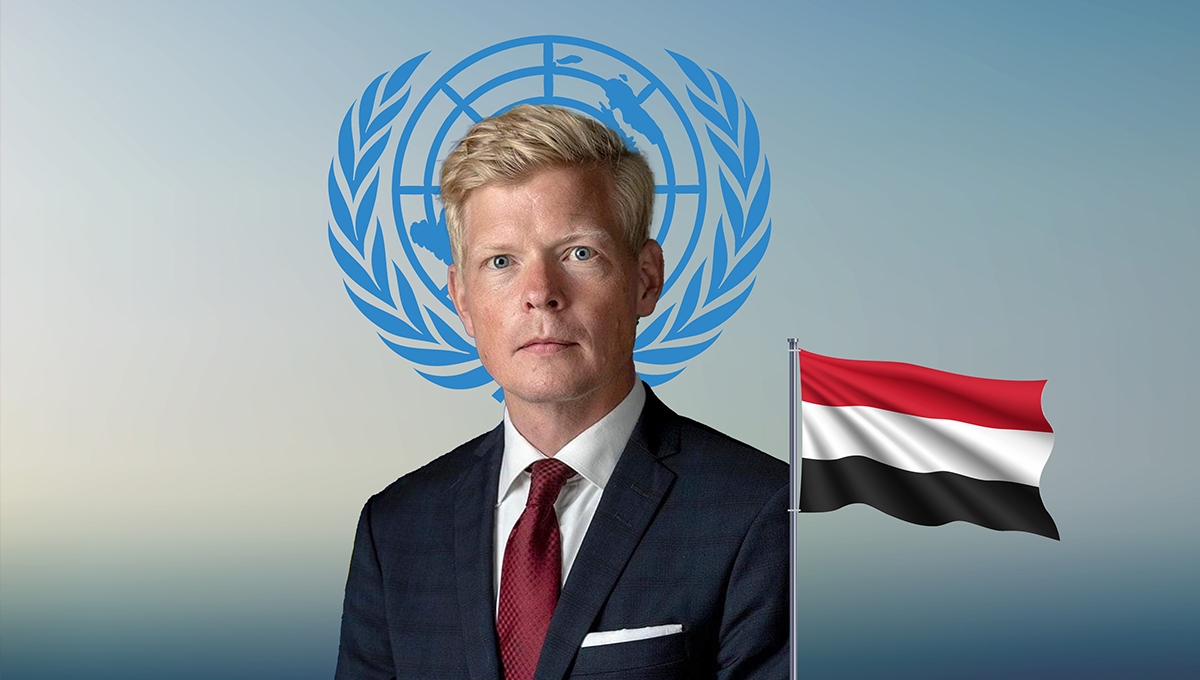On August 6, 2021, the Secretary-General of the United Nations, António Guterres, appointed Hans Grundberg of Sweden as the new UN envoy to Yemen, to be the fourth envoy since 2011, following Jamal Benomar, Ismail Ould Cheikh, and finally Martin Griffiths.
Grundberg is scheduled to assume his duties on September 5, 2021. However, he faces several challenges that may hinder his success in reaching a political solution between the two sides of the Yemeni crisis, thus repeating the experience of his three predecessors.
Intertwined Complications
Hans Grundberg could be facing several challenges, as such:
1- Internal obstacles:
These are relevant to the tribal structure of the Yemeni political system, and the failure to overcome this structure througout the past six decades, since the revolution of September 1962, which overthrew the rule of the Imamate in the country, until the Houthi militia coup in September 2014. This is in addition to the Houti ideology, which implies an absolute belief in their right to rule alone, not to mention their intransigence and their hampering all initiatives put forward by former UN envoys or regional and international entities toward a political solution for the Yemeni crisis. Furthermore, the fragmentation of the Yemeni political components and the association of some of them with countries in the region, similar to the Houthis' absolute dependence on Iran, has contributed to the failure of these components to unify under one national roof.
2- Regional hurdles:
These are represented in regional countries’ support for Yemeni components and hostility to others. Thus, the war in Yemen has become based on interests associated with the regional influence of some countries, such as the Iranian and Turkish interference against the Arab coalition to support legitimacy in Yemen.
3- International barriers:
These include the failure of the international community, particularly the Security Council, to find a solution to the Yemeni crisis and to impose pressure within the framework of the rules of international legitimacy and relevant UN resolutions. This is particular to Resolution No. 2216 (2015) demanding that the Houthis withdraw from all areas seized during the latest conflict, relinquish arms seized from military and security institutions, and cease all actions falling exclusively within the authority of the legitimate Government of Yemen. Added to these challenges are the competing interests of international powers over the Yemeni conflict within their competition in the Middle East. Some of them may also be interested in the continuation of this conflict, as this is of financial and political benefit to them.
Determinants of Success
Accordingly, the Yemeni scene is becoming more complex over time. In order to understand the situation, the new UN envoy must use all his capabilities to avoid mistakes of his predecessors, understand the internal reality, consider its parties and relations externally and internally, and to try to establish an international community that supports his mission.
Some of the proposed approaches to the success of the new UN envoy to Yemen may be outlined as follows:
1- Understanding the reality of the role:
What contributed to the failure of the three previous UN envoys was the attempt to curb the role and authority of the envoy. The Secretary-General of the United Nations, Antonio Guterres, has previously mentioned that the envoy is not responsible for war or peace, and that his role is limited to offering the parties to the conflict ways to end war. Some may have reservations regarding these statements, because the most important goal of the UN is to establish international peace and security. Even if the envoy is not responsible for war, he is concerned with maintaining peace according to his mission. Thus, the new UN envoy, Grundberg, should seek peace in Yemen and impose a solution pursuant to the resolutions of international legitimacy.
2- Implementing UN resolutions:
Yemen is subject to the provisions of Chapter VII of UN Charter, which allows the use of force against any violation of UN resolutions and charters. Hence, the UN envoy must use this authority in his duties, if he wishes to achieve success in confronting the elusive Houthis. Applying pressure and imposing threats of sanctions may seem to be the most effective way in times of war.
3- Commitment to internationally-endorsed peace principles:
There are three references that represent the pillars of a political solution in Yemen, which are the Gulf initiative, the outcomes of the comprehensive national dialogue and the relevant international resolutions, particularly Resolution No. 2216. Any deviation from these pillars is an absurdity that leads to intensifying and prolonging the current crisis. One of the reasons for the failure of the previous envoys is dwelling on secondary issues apart from these core principles.
4- Creating supportive international unity:
Grundberg works under the authority of the UN, which is not above the authority of countries, but rather a governing authority among them. Major countries are known to have the upper hand in implementing international resolutions. It is clear that these countries lack firmness with the Houthi militia, which helps the latter to persist towards the military option and to evade peace.
Thus, should this situation continue, the new UN envoy will not succeed, similar to his predecessors. In addition to the UN special envoy to Yemen, there are two other envoys from the US and Europe. This indicates the diverse views regarding the Yemeni crisis and the lack of unity on one position or slackness in dealing with the violations of the Houthis.
5- Restoring Yemeni legitimacy:
The former UN envoys dealt with the Houthi militia as a valid player in the crisis, and placed it in the balance against the legitimate authority, which exacerbated the Yemeni crisis. The goals and references of peace are clear about the necessity of restoring legitimacy, since it is sovereign, and the objective is to defeat the coup and relinquish the state’s weapons. Therefore, the new envoy should take this into account to make his mission successful.
6- Impartiality and credibility:
The UN envoy to Yemen must be faithful to himself and to his mission, work professionally and put pieces together without bias or complacency, and announce the party obstructing peace. The mission of the previous envoys failed due their lack of clarity and their failure to announce the (Houthis) party as the reason behind the failure of the peace talks, in their attempt to avoid confrontation with this party.
7- Separating the Yemeni crisis from the Iranian nuclear file:
Countries often make their intervention in some external crises a pressure card to achieve their own goals regarding other issues. This applies to the Houthi case being linked to Iran and the course of its nuclear issue, which intensifies the Yemeni crisis. Last May, Timothy Lenderking, the US envoy to Yemen, said that the progress of discussions on the Iranian nuclear file would contribute to the progress of the Saudi-Iranian dialogue and benefit Yemen. Therefore, in order for the mission of the UN envoy to succeed, he must cooperate with major countries to separate the issues of the Yemen and Iran crises.
8- Taking other countries of the region into account:
The Yemeni crisis is part of the struggle for influence amidst the major countries in the region. Thus, the UN envoy must deal with that reality, as there is no solution in Yemen without a regional consensus amidst the major influential countries.
9- Political penetration:
The previous UN envoys in Yemen sought to split the conflict issues into what is humanitarian, economic, political and military. Thus, the crisis was not discussed as a whole, which contributed to its fragmentation and failure on the humanitarian and economic levels, due to the absence of a clear political solution.
10- Realizing that the Houthis are an ideological group:
Undoubtedly, ideological conflicts are the most severe in the world, and the Houthi militia's creed is no secret, as it seeks to establish religious and secular authority. Consequently, the UN envoy must be aware that he must seek to dissuade this militia from its goal of monopolizing power and excluding others.
11- Understanding the internal contradictions of the Yemeni society:
The former UN envoys did not delve into the complexities of Yemeni society between sectarian, regional, cultural, social and political matters. They contented themselves with convening with some political leaders and representatives of civil society who do not represent the "broad spectrum" of the Yemenis. Additionally, the tribal society, clan influences and the influence of political money all play a pivotal role in fueling the fire of the crisis. The UN envoy must realize this situation to seek ways to penetrate the crisis.
12- Avoiding “Passive Flexibility”:
Previous envoys adopted a policy of motivation and extreme flexibility toward the Houthi militia. This led to disastrous results, causing further Houthi military escalation, particularly on the Marib front, in addition to the continued targeting of civilians and Saudi territory. Former Yemeni Foreign Minister, Abdulmalik Al-Mekhlafi, stated that the claim of neutrality and excessive flexibility sometimes leads to "passive flexibility", which prolongs war and exacerbates problems.
13- Not compartmentalizing solutions on a regional basis:
The Stockholm Agreement, December 2018, is a serious precedent in the peace process in Yemen. It legislated cease of war in Al Hudaydah and handing it over to the Houthi militia. This fragmented the peace process regionally under a humanitarian justification, contributing to prolonging the war and stalling the peace process. There was some selectivity in the implementation of the terms of this agreement, as some terms relevant to Al Hudaydah were implemented, while others were ignored, such as opening the crossings to the city of Taiz, which confirms the failure of these fragmented solutions.
14- Ending Houthi violations:
Previous envoys have often been negligent in punishing the Houthis who violate human rights, whether in the field, bombing residential neighborhoods, using civilians as human shields, recruiting children or laying mines. Therefore, the mission of the UN envoys failed, because condoning those violations intensified their severity.

In conclusion, it is clear that the personality of the UN envoy, his negotiating capabilities, his experiences in penetrating opponents and his detection of the shortcomings, weaknesses and strengths of each party, all contribute positively to finding solutions, developing a scientific methodology, and defining a mechanism for negotiations. Moreover, seeking a UN strategy, which is based on implementing the resolutions of international legitimacy by presenting bold initiatives that are reinforced by the authority of the Security Council, is one of the means required to establish peace and security in Yemen. This all depends on international and regional consensus and the good intentions of the parties to the conflict.


